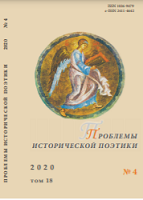Миросозерцание и поэтика Н. В. Гоголя в критике Русской эмиграции (1921–2018)
Nikolai Gogol’s Worldviews and Poetics in the Literary Criticism of the Russian Emigration (1921–2018)
Author(s): Vladimir VoropaevSubject(s): Christian Theology and Religion, Studies of Literature, Recent History (1900 till today), Russian Literature, Migration Studies
Published by: Петрозаводский государственный университет
Keywords: Gogol; Russian Emigration; religious outlook; biography; poetics; interpretation; comic; terrible; rhythmic organization of the text; motif; intertext; album prose;
Summary/Abstract: The Russian émigré community paid particular attention to Nikolai Gogol (possibly comparable only with Aleksandr Pushkin and Fyodor Dostoevsky). Themes and issues in Russian émigrés’ studies of Gogol are highly diverse, although they predominantly focus on Gogol’s poetics and religious views. Gogol and Dostoevsky, Gogol and Christian attitude to the laughter, Gogol’s theater aesthetics, Gogol’s progress as an author, rhythm in Gogol’s prose, problem of the man in Gogol - these are the issues in Gogol’s poetics have initially been posed by the literary critics in the Russian émigré community and subsequently developed by Russian scholars. Thanks to the works by Konstantin Mochulsky, Vasily Zenkovsky, Georgy Florovsky, Dmytro Chyzhevsky and Semyon Frank, it became possible to rebuff some deeply enrooted erroneous concepts of Gogol’s personality. Gogol studies conducted in the Russian émigré community are an essential part of contemporary literary criticism. Despite limited sources, works by Russian émigré authors marked a new and essential stage in Gogol studies.
Journal: Проблемы исторической поэтики
- Issue Year: 18/2020
- Issue No: 4
- Page Range: 138-163
- Page Count: 26
- Language: Russian

